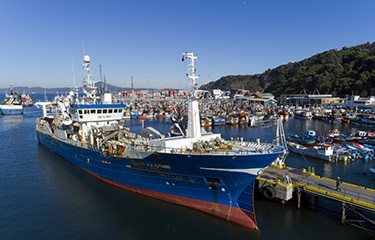Santiago, Chile-based fishing and salmon-farming firm Blumar has published its annual sustainability report, in which it outlines five corporate sustainability goals to be reached by 2027: a reduced carbon footprint, more sustainability certifications, lower use of antibiotics, adoption of circular waste management, and growing its energy efficiency.
One of the indicators highlighted in its report is the supply, since April, of non-conventional renewable energies to all operations, leading to a substantial reduction in emissions.
In its salmon-farming operations, the company said the use of antibiotics had decreased 31 percent when compared to measurements made in 2017. Blumar's objective is to reach a total reduction of 58 percent in the next six years with the use of innovation and technology.
The company said it will continue to focus on innovation to protect people and the ecosystem, while also contributing to optimal operations performance.
Blumar posted first-quarter profits of USD 3.6 million (EUR 2.9 million), versus a bottom line of USD 300,000 (EUR 245,000) in the same quarter of 2020, with revenue of USD 133 million (EUR 109 million) in the period, which was 15 percent higher than the same quarter one year previous. The result was particularly driven by the fishing segment, which surged 31 percent to USD 57.3 million (EUR 46.8 million).
In March, Chile’s Superintendency of the Environment (SMA) brought Blumar up on four charges for breaches of environmental authorizations at the company’s Forsyth grow-out center, located in the Las Guaitecas National Reserve in the Aysén Region.
The charges are broken down into two categories, composed of one felony and three lesser infractions. The most serious charge was for exceeding the maximum authorized production at Forsyth during the production cycle between December 2016 and April 2018, as a result of which Blumar could be subject to revocation of its environmental qualification resolution, closure, and a fine of up to CLP 3.1 billion (USD 4.3 million, EUR 3.6 million).
Photo courtesy of Blumar







